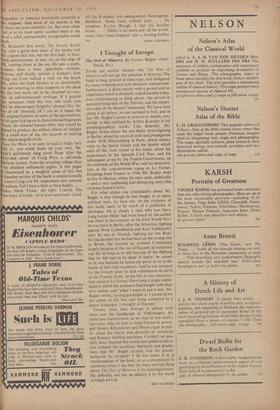I Thought of Europe
The Owl of Minerva. By Gustav Regler. (Hart- Davis, 3Cs.) THERE are several reasons why The Owl of Minerva will not get the attention it deserves. The book is long, printed in close type, and disfigured by many irritating and over-dramatic mannerisms; furthermore, it deals mainly with a period and an experience which is distinctly unfashionable today. even embarrassing to think about—the period in question being that of the Thirties, and the experi- ence that of the lapsed Communist. We have read about it all before, we are inclined to feel; and in fact Mr. Regler's career is, even in its details, very similar to that outlined by Arthur Koestler in his autobiographical works. Like Koestler, Mr. Regler writes about the pre-Hitler street-fighting in Berlin; about his years of exile and propaganda tinder Willi Mfinzenberg in Paris; about uneasy visits to the Soviet Union and the doubts which each of the visits raised in his mind; about his experiences in the Spanish Civil War; and his subsequent arrest by the French Government, on the outbreak of the World War, and his incarcera- tion in the concentration camp at Le Vernet. Escaping from France in 1940, Mr. Regler went to live in Mexico, where his story ends, politically —and a very saddening and dismaying story this reviewer found it to be.
For what strikes one immediately about Mr. Regler is that though he has fought in so many political wars, he does not, on the evidence of this book, seem to be much of a politician or ideologue. He is simply a man who was there. Long before Hitler had been heard of. the author was there in the trenches of the First World War; he was there in Berlin, after the Armistice, fighting against Rosa Luxembourg and Karl Liebknecht; later he was in Munich, fighting for the Reds, having decided that he had been on the wrong side in Berlin. He became an avowed Communist largely because of the rise of Nazism; he remained one for as long as he did because of the fighting that he felt had to be done in Spain; he ceased to be one because he found the party to be in the hands of liars and murderers. And he was arrested by the French after he had volunteered to.serve in the French Army. In his but in the concentra- tion camp at Le Vernet there hung a single stable- lantern, which the prisoners had bought with their own money, and 'when I went to put it out,' Mr. Regler writes, 'saying goodnight as I passed down the centre of the hut, and being answered in a dozen languages, I thought of Europe.'
Twenty years later Europe is ablaze with neon and the headlamps of Volkswagen; the American Government, as we read in last week's Spectator, (ies its best to keep Franco in power; and Messrs. Khrushchev and Nixon argue in pub- lic about the merits and demerits of American and Russian washing machines. Couldn't we pos- sibly have reached this moral and political eleva- tion without the sacrifices, betrayals and desola- tions that Mr. Regler records, and the greater holocaust he escaped? 1 do not mean it as a condemnation of the book, or as a compliment to ourselves, when I say that the most moving thing about The Owl of Minerva is its meaninglessness: the difficulty one has in relating it to the world in which we live.
DAN JACOBSON






































































 Previous page
Previous page